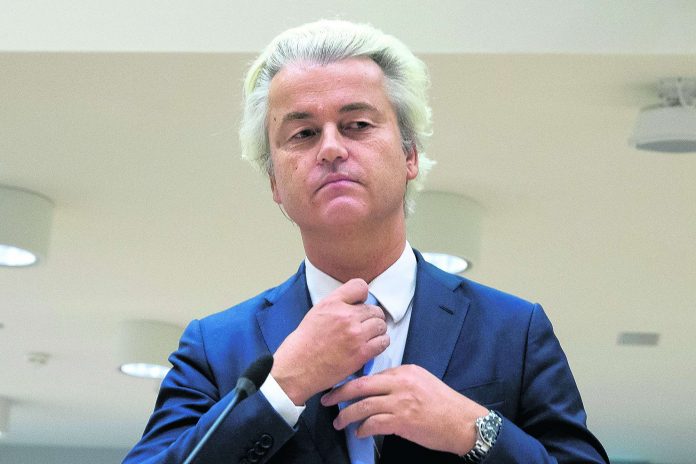
A Dutch appeals court upheld Friday the conviction of anti-Islam lawmaker Geert Wilders for insulting Moroccans in comments he made at an election night gathering in 2014. However, the court overturned Wilders’ conviction for inciting discrimination.
The appeals court did not punish Wilders for his conviction on the charge of insulting a group, which he can appeal to the Dutch Supreme Court.
The comments for which Wilders was convicted “can contribute to polarization within Dutch society, while in our democratic, pluralistic society respect for others, especially minority groups, is of great importance,” said Presiding Judge Jan Maarten Reinking.
Wilders, whose political career has been based largely on his strident anti-Islam rhetoric, was convicted in December 2016 of insulting and inciting discrimination against Moroccans in 2014. He was not given a punishment.
Speaking to reporters outside court, Wilders slammed the case as a “political trial” and said the court “has dumped freedom of speech in the garbage. Not only for me, but for everybody.”
The Party for Freedom leader has always insisted he is innocent and branded his prosecution a politically-motivated attempt to muzzle him and an attack on the freedom of speech. The appeals court rejected his claims of political interference in the case and said that free speech also has limits.
Friday’s conviction was based on comments Wilders made on the night of Dutch municipal elections in 2014 at a meeting in a Hague cafe. In what appeals judges said was a carefully prepared exchange, Wilders asked supporters whether they wanted more or fewer Moroccans in the Netherlands. That sparked a chant of “Fewer! Fewer! Fewer!” — to which he replied, “we’ll take care of it.”
The ruling Friday comes some six months before national parliamentary elections in the Netherlands. According to a poll of polls, Wilders’ party is the largest opposition party.
Explaining why Wilders was not given a punishment Friday, Reinking said noted that Wilders has lived for years under tight security due to threats.
“The accused has already for years paid a high price for expressing his opinion,” Reinking said.



















